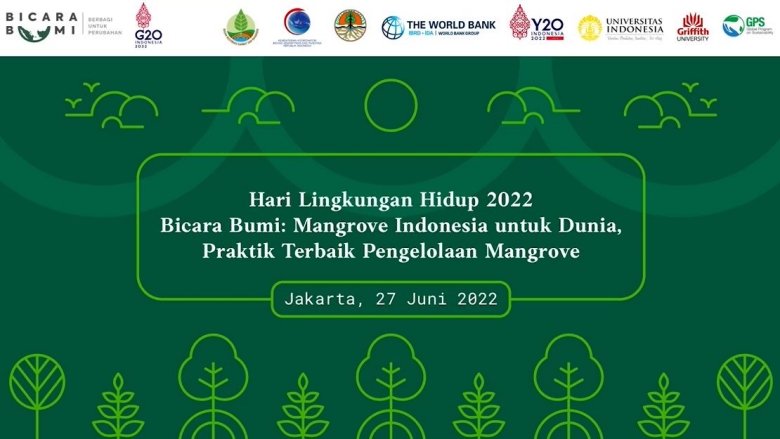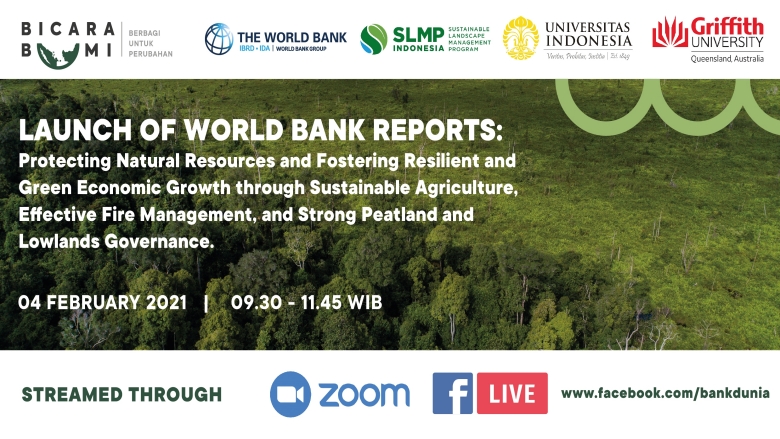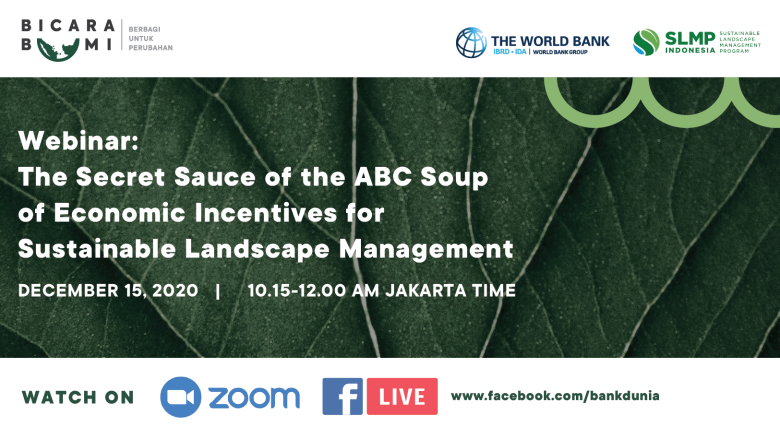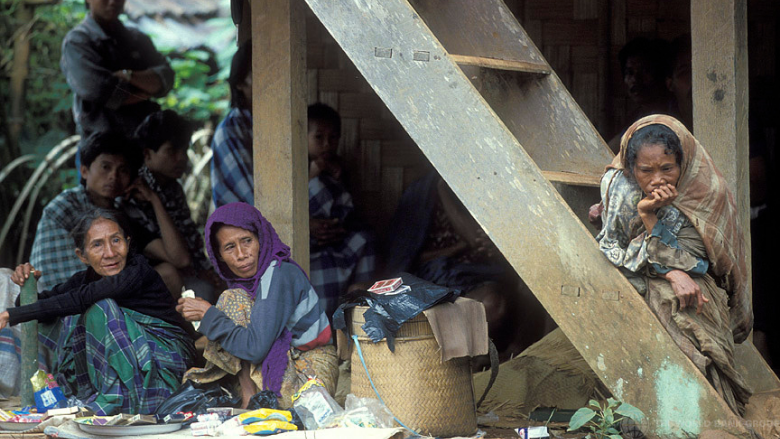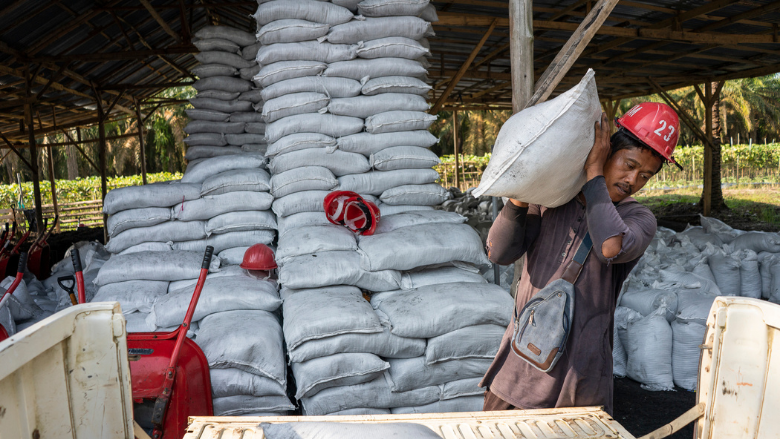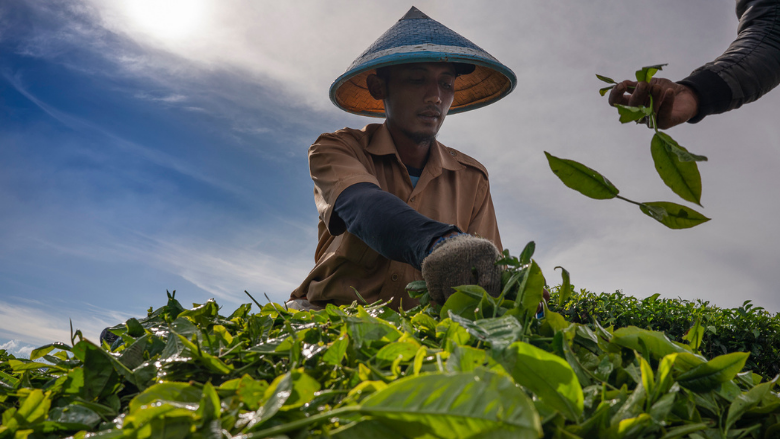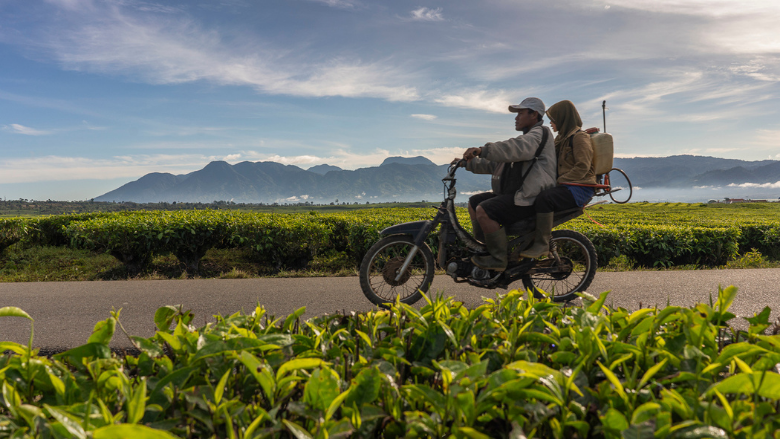Indonesia Sustainable Landscapes Management Program (SLMP)
Bicara Bumi June 2022: Indonesia’s Mangroves for the World, Best Practices in Mangroves Management
The World Bank, in collaboration with the Ministry of Environment and Forestry (MoEF), the Peatland and Mangrove Restoration Agencies (BRGM), the Coordinating Ministry for Maritime Affairs and Investment (CMMAI), the University of Indonesia, Griffith University and Y20, hosted another Bicara Bumi hybrid seminar on Monday (June 27, 2022). The event – bringing together speakers from the MoEF, BRGM, CMMAI, the Ministry of Marine Affairs and Fisheries (MMAF), Yayasan Konservasi Alam Nusantara (YKAN) and the World Bank – discussed best practices and lessons learned on mangrove rehabilitation, touching the issues of pre- and post-rehabilitation management, close involvement of local communities, and blue finance. On this occasion, the World Bank also launched “The Economics of Large-Scale Mangrove Conservation and Restoration in Indonesia” Report.
Bicara Bumi February 2021: Launch of Three World Bank Reports on Indonesia Sustainable Landscape Management
In collaboration with the Institute for Sustainable Earth and Resources of Universitas Indonesia (IESR UI) and Griffith University Australia, World Bank’s Environment, Natural Resources, and Blue Economy (ENB) Global Practice hosted another Bicara Bumi webinar to launch the 3 World Bank Sustainable Landscape Management Program Reports: 1) Sustainable Lowland Agriculture Development in Indonesia. 2) Improving Governance of Indonesia’s Peatlands and Other Lowland Ecosystems, and 3) Addressing Persistent Forest and Land Fires in Indonesia
Bicara Bumi December 2020: The Secret Sauce of the ABC Soup of Economic Incentives for Sustainable Landscape Management in Indonesia
The World Bank Indonesia’s ENB kicked off a Bicara Bumi webinar series on December 15, 2020, aimed to promote cutting-edge technical knowledge, share good practices and experience, strengthen policy dialogue and provide a platform to explore opportunities for collaboration amongst Indonesian and global stakeholders. This edition discussed the ‘secret sauce’ behind successful economic incentive schemes across local, national, and international levels to promote sustainable landscape management in Indonesia, involving an inclusive dialogue with representatives from the government, private sector, and civil society. The event was attended by over 550 participants on Zoom and Facebook live.
News & Events
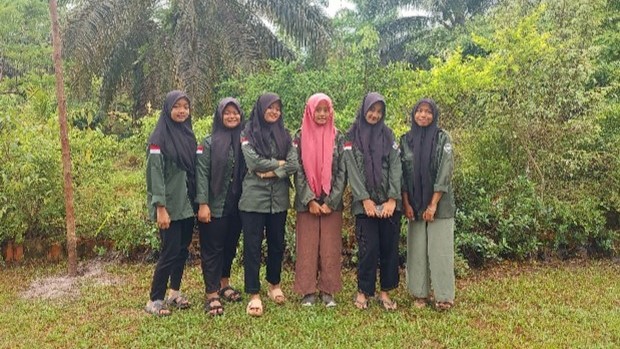
Delima Village Forest Protection Agent
The Jambi Sustainable Landscape Management Project (J-SLMP) aims to promote sustainable and inclusive growth in Jambi through an integrated approach. The project has empowered communities in Jambi to initiate restoration of forested land, while fostering income through the sustainable harvesting of non-timber forest products, as well as promoting ecotourism. Tanjung Jabung Barat Forest Management Unit (FMUs) is a community group supported by J-SLMP. The FMU facilitates community business development, Non-Timber Forest Products (NTFPs) training through planting superior seeds (areca nut and hardwood) and cultivating honeybees, as well as establishing an MPA (a community group who seeks to mitigate forest fires). Further, the FMU also collaborates with the Sanggar Alam Delima (SAD) community in Jambi Province in fighting for environmental preservation through their field school, led by Si Mbok, a community member who initiated the school due to concerns about forest encroachment and palm oil displacement. The SAD community is now led by young women under the Youth Forest Ranger group and actively patrols forests, documents environmental damage, and prevents forest fires.
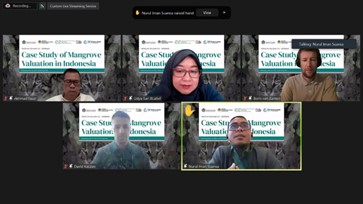
Sekolah Valuasi 2.0 Webinar: Shaping the Future of Indonesia’s Natural Capital and Ecosystem Services Valuation
In March 2024, the World Bank together with the Ministry of Finance conducted a series of webinar of Sekolah Valuasi 2.0. With more than 300 participants joining online, the primary objectives of Sekolah Valuasi are to build an ecosystem of experts and knowledgeable practitioners (and users of valuation) that engage government, academia, and development partners, provide participants with a comprehensive understanding of policy context and economic valuation techniques, equip participants with the knowledge and skills to apply economic valuation methods in practical scenarios, and foster an appreciation for the importance of valuing ecosystem services in policy-making and natural resource management.
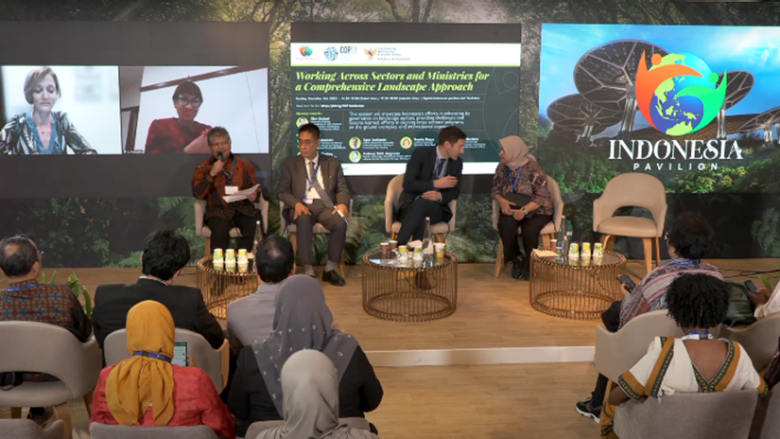
Supporting Indonesia’s Climate Ambition at the COP 28 in Dubai
At COP28 in Dubai, the World Bank’s SLMP facilitated stakeholders, speakers and provided technical assistance as part of nine sessions at the Indonesia pavillion. Invited speakers from government and development partners shared insights and experiences on climate finance, blue carbon, the FOLU Net Sink 2030 policy, and sustainable landscape management. Some key narratives disseminated by the World Bank in these sessions include climate finance (e.g., strengthening REDD+ infrastructure), blue carbon (e.g. the economic value of blue carbon and catalyzing and scaling investments in blue carbon finance, support for sustainable mangroves’ management), FOLU net sink (e.g. the Bank support towards Indonesia's FOLU net sink target), and landscape approach (cross-sectoral collaboration to balance the competing use of land). The World Bank team also supported the Coordinating Ministry of Economic Affairs in organizing an event on the lessons learned and best practices of working across sector for a comprehensive landscape. These discussions aim to create further opportunities for collaboration, dialogue and partnership at the national and international level that will further support Indonesia’s economic goals and climate ambitions. Watch the recording from the Indonesia Pavilion here.
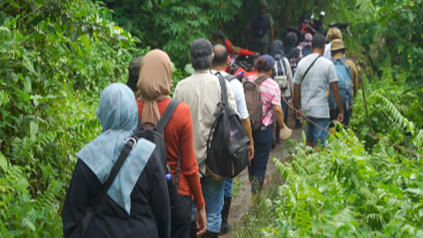
The Strengthening of Social Forestry in Indonesia (SSF) Mid-term Review Mission
The Strengthening of Social Forestry in Indonesia (SSF) Project, funded by the GEF and implemented by the Ministry of Environment and Forestry (MoEF) since 2021, seeks to facilitate communities' legal access to forests and promotes the sustainable management of 300,000 hectares of forests by communities in six project sites (i.e., Lima Puluh Kota, South Lampung, Dompu, Bima and West Halmahera District and Bima City) in Indonesia. In November 2023, the MoEF and the World Bank jointly conducted a Mid-Term Review (MTR) mission in West Halmahera, North Maluku Province, which included technical discussions, field observation and engagement with local beneficiaries. The mission confirmed that the project is on the right track in supporting the Government to strengthen the support system for the implementation of Social Forestry National Program. Feedback from beneficiaries also confirmed the importance of Social Forestry scheme as both tenurial and livelihood solutions for forest dependent community, while at the same time maintaining the health of the forest ecosystem and its function as carbon sink to mitigate climate change.
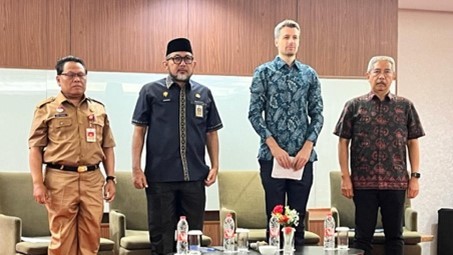
Enhancing Forest and Land Fire Management to Achieve Emission Reduction Goals within the FoLU Net Sink 2030 Target
From October 24 to 25, 2023, the World Bank team together with the Provincial Government of Jambi held a workshop on “Forest and Land Fire Management for National Carbon Emission Reduction under FoLU Net Sink 2030 Target.” The workshop aims to support the Provincial Government of Jambi, the Ministry of Environment and Forestry, and other key stakeholders in improving forest and land fire management to enhance Carbon Emission Reduction within the FoLU Net Sink 2030 target. This workshop serves as a vital platform for advancing climate mitigation and adaptation efforts by exploring landscape-level activities across Ministries/Agencies to mitigate the potential impact of El Niño on emission reduction performance.
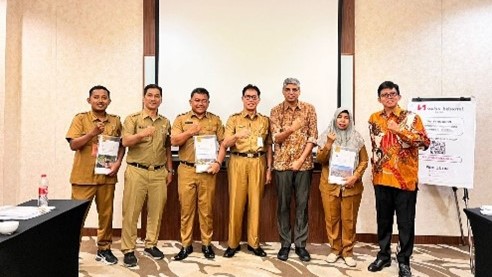
The World Bank Hands Over the Integrated Landscape Investment and Action Plan in Three Districts to Government of Jambi
On October 23, 2023, the World Bank handed over the documents of the Integrated Landscape Investment and Action Plan for Micro-landscapes in the Districts of Merangin, Tanjung Jabung Barat, and Muaro Jambi to Jambi Provincial Government and each of the district governments. Landscape investment plans are integrated strategies that aim to address various challenges and promote sustainable resource management within a specific landscape. These plans take a holistic approach by considering the geographical, environmental, and socio-economic aspects of the landscape. The main objective of landscape investment plans is to overcome barriers created by a sectoral approach and connect all stakeholders involved, including local communities, in order to achieve sustainable development. The hand over marked a final milestone of the support provided by the World Bank to Jambi Provincial Government to demonstrate the development of landscape investment plans in the three districts.
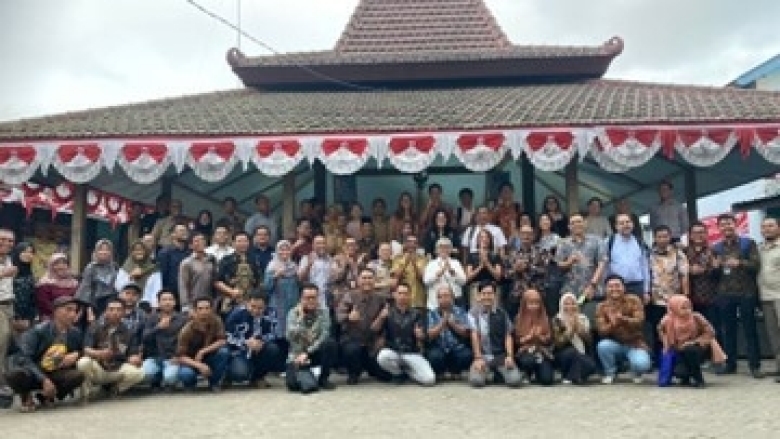
Understanding the Process of Participatory Mapping and Systematic Land Registration in Pasuruan Regency, East Java
From September 10 to 12, 2023, the World Bank team together with the Government of Indonesia and the Sustainable Landscape Management – Multi Donors Trust Fund (SLM-MDTF) donors, held a joint land administration field visit to Pasuruan Regency, East Java. One of the main objectives of the visit was to understand the village-based participatory mapping and systematic land rights (PTSL-PM) process, an integral aspect in the overall World Bank-financed Program to Accelerate Agrarian Reform (One Map). The visit highlighted progress being made in systematic land registration in Pasuruan and the impact on beneficiaries participating in the program. This insight would further contribute to the next steps of the program design and how land administration inside and alongside forests can strategically support Indonesia’s FOLU (forest and other land use) Net Sink 2030 climate agenda.
Photo credit: World Bank, 2023
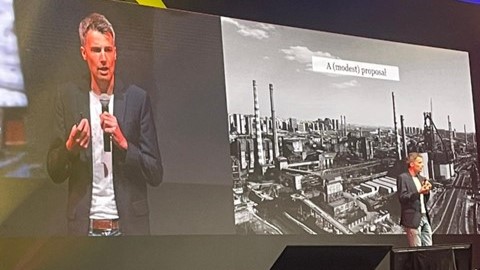
IDEAFEST - The Green Conundrum: Return of Investment or Impact?
On the 1st of October 2023, SLMP Team Lead and World Bank Senior Environmental Economists, David Kaczan, delivered a presentation about “The Green Conundrum: Return of Investment or Impact” to a 1,000 young people audience at IDEAFEST 2023, a festival of communities in the creative industry in Jakarta. The presentation focused on how Indonesia can have a growth model that balances environment and development, and whether to measure return of investment or impact when dealing with resource allocation. The main aim of this presentation was to highlight an opportunity for private sectors, including in tech, digital, and creative industries to seize what field and sector would be most profitable yet have a great climate mitigation impact.
Photo credit: World Bank, 2023
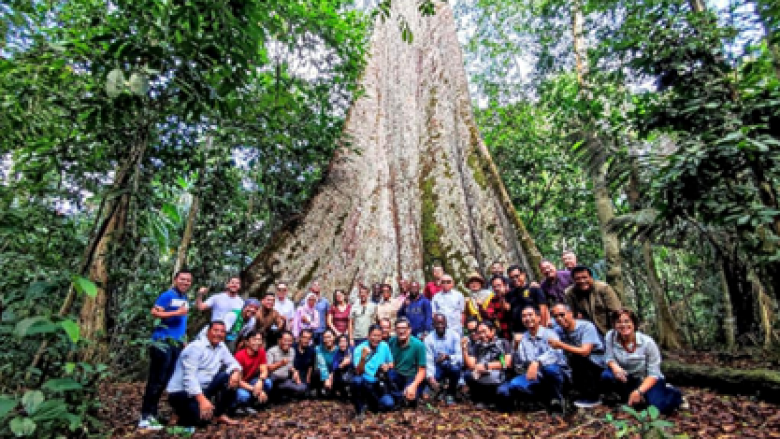
Facilitating Trilateral Partnership through South-South Knowledge Exchange between Brazil, Indonesia, and the Democratic Republic of Congo
In May 2023, the World Bank facilitated a delegation with the Government of Indonesia and the Democratic Republic of Congo on a week-long, three-nation, South-South Knowledge Exchange to Brazil. This exchange aimed to strengthen the knowledge and understanding of national policies and large-scale jurisdictional programs to reduce deforestation and strengthen professional ties among the three nations at the national and sub-national levels. At the end of the trip, thirty-six people from the three nations gathered around a Sumaúma tree in Alta Floresta, Brazil, expressing their spirit and commitment to collaborate on conserving tropical forests and improving the welfare of rural communities. This is a testament to how international collaboration and dialogue can support countries to work together to create a better future for their people and the planet.
Photo credit: The World Bank
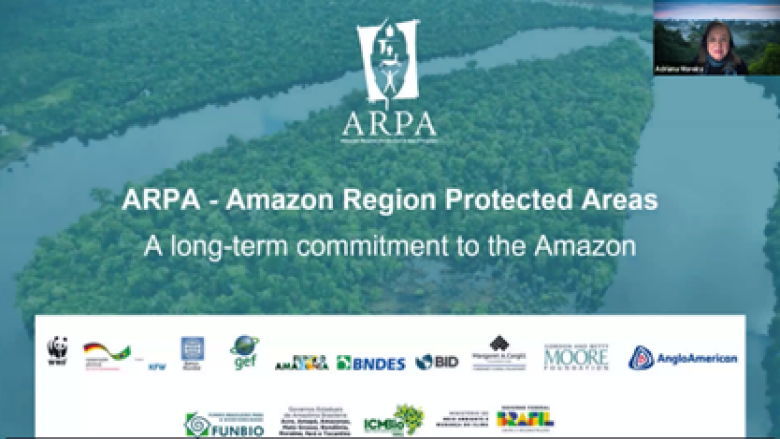
Webinar: What can we learn from the Amazon on Conservation Finance? Lessons Learned and Opportunities for Indonesia
The Government of Indonesia has made important gains in protecting Indonesia’s valuable forest ecosystems through a range of reforms and is targeting an establishment of a conservation financing system mechanism by 2024. To support this effort, the World Bank facilitated a webinar to share best practices from the Amazon for the design of conservation financing mechanisms and to explore opportunities for Indonesia. This includes lessons learned from the Brazilian Fund for Biodiversity (FUNBIO), which supported the Amazon Regions Protected Area (ARPA) Program that helped establish, expand, and strengthen the protection of the world’s largest 60-million-hectare protected area network. The webinar aims to foster a community of practice in Indonesia interested in conservation financing and deeper cooperation on sustainable management and conservation of forests.
Photo credit: The World Bank
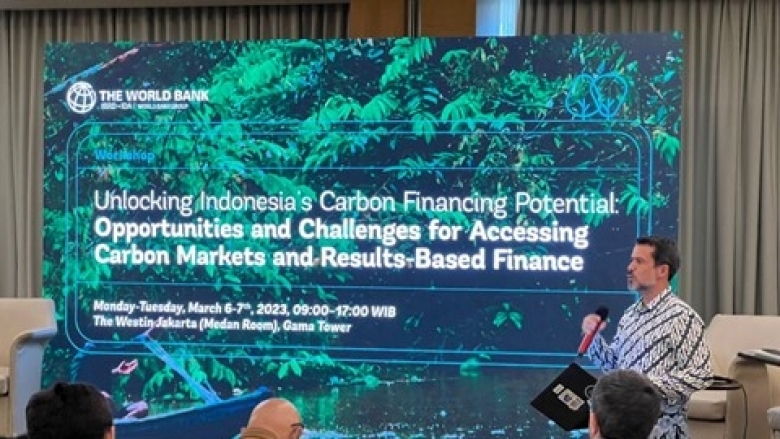
Unlocking Indonesia's Carbon Financing Potential: A National Workshop Held to Discuss Opportunities and Challenges for Accessing Carbon Markets and Results-Based Finance
In early March 2023, the World Bank conducted a 2-day national workshop in Jakarta on Indonesia’s Carbon Financing Potential, aimed at contributing to Indonesia’s ongoing efforts to scale up financing for its Nationally Determined Contribution (NDC) targets. Speakers from the World Bank, government and others shared review of the global landscape of results-based carbon and climate finance; development of Indonesia's planned carbon pricing regulation, Article 6 mechanisms, and the voluntary and compliance carbon market; and key building blocks needed for results-based carbon and climate finance programs. The forest, agriculture, and blue carbon sectors were prioritized given their readiness for financing.
Photo credit: World Bank
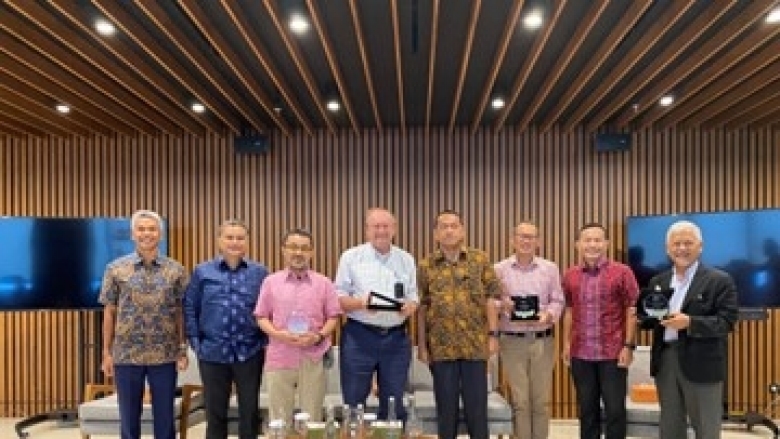
Mainstreaming Biodiversity Importance in Indonesia's Infrastructure Projects
In early February 2023, the World Bank Environmental Risk Management (ERM) team in collaboration with Indonesia Infrastructure Finance (IIF) held an intimate sharing session in Jakarta to discuss biodiversity aspects in relation with business and investment activities in Indonesia. Speakers included George Ledec (Biodiversity Conservation Specialist, World Bank retiree and consultant) and Krisnan Isomartana (Senior Environmental Specialists, World Bank) who shared their experiences to IIF’s Board of Commissioners and Investment Officers in implementing biodiversity policies and related case studies. This session further highlights the importance of environmental safeguards in line with Indonesia’s rapid economic development to ensure shared prosperity and sustainable economic growth.
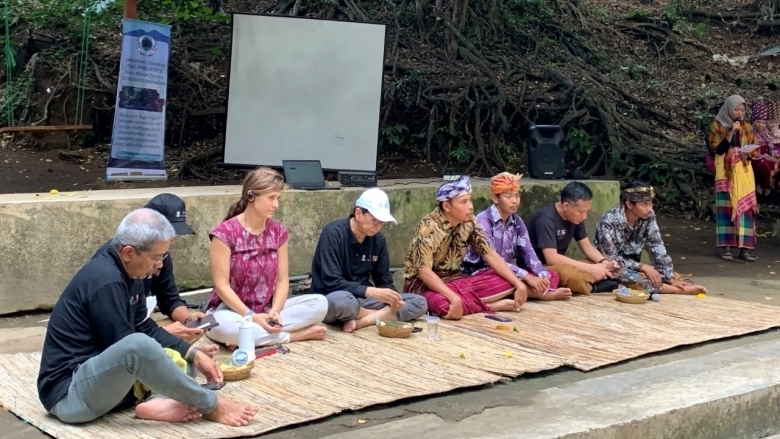
West Nusa Tenggara’s Forest Management Units: A National Model for Forest Management
In line with the completion of the Forest Investment Program II (FIP II) in Indonesia by the end of 2022, the World Bank Environment, Natural Resources and Blue Economy (ENB) global practice and the Indonesian Ministry of Environment and Forestry (MoEF) conducted a join mission to West Nusa Tenggara to discuss with the provincial government lessons learned from the project and how implementation in West Rinjani and Batulanteh Forest Management Units (FMUs) could serve as a model for other FMUs across Indonesia. MoEF is currently preparing an FMU model that can implement Indonesia’s Forestry and Other Land Uses (FOLU) Net Sink 2030 policy, which aims to achieve a balance or even surplus of sequestration of greenhouse gas emissions from the forestry and land use sector by 2030. The join mission opened discussion on key elements to prioritize for replication, which includes implementation of social forestry and commitment of provincial governments to achieve low-carbon and climate resilient development.
Photo credit: World Bank/ Tini G.
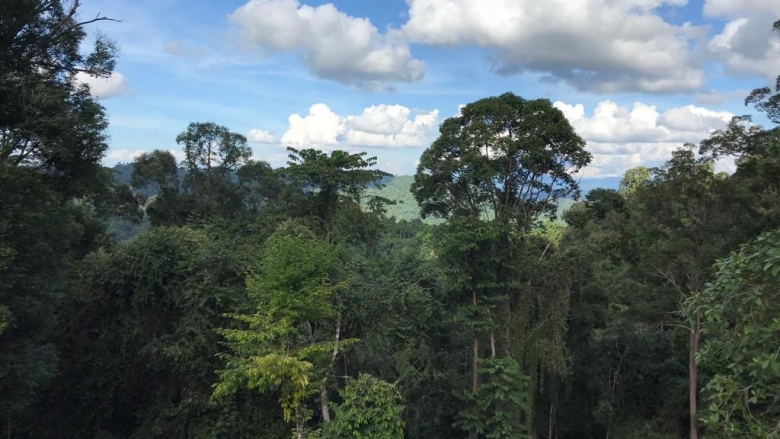
Indonesia Receives First Payment for Reducing Emissions in East Kalimantan
On November 8, Indonesia received an advance payment of US$20.9 million (IDR 320 billion) under the Emissions Reduction Payment Agreement between the Government of Indonesia and the World Bank’s Forest Carbon Partnership Facility (FCPF) to reduce emissions from deforestation and forest degradation (REDD+) in East Kalimantan province. Under the Agreement, Indonesia would receive up to US$110 million (IDR1.6 trillion) for verified emissions from reducing deforestation and forest degradation.
Indonesia has become the first country in the East Asia Pacific region to receive payments through the World Bank’s FCPF, which represents 13.5 percent of the value of the emissions reduction reported in the Government of Indonesia’s Monitoring Report for the 2019-2020 crediting period. The full payment will be released once the independent third-party verification of the reported emissions reductions, which is currently ongoing, is complete.
Photo credit: World Bank/ Efrian M.
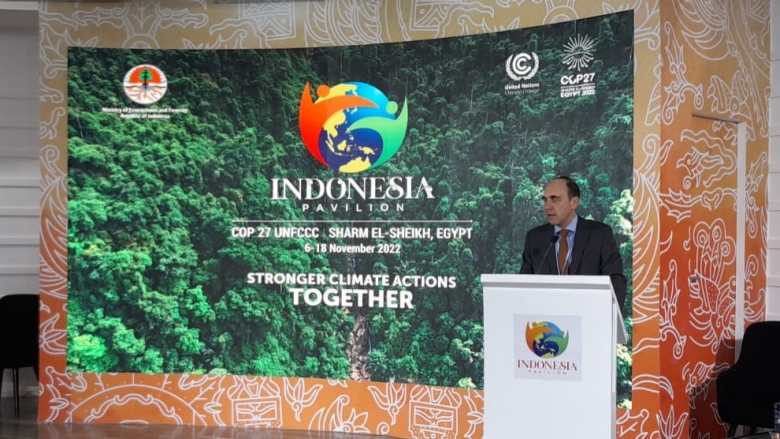
Supporting Indonesia’s Climate Ambition at the COP 27 in Egypt
The Indonesia and World Bank Group pavilions were busy places at COP 27 in Egypt this year, with a tight schedule of side events highlighting important climate activities in Indonesia. Invited speakers from government and development partners shared insights and experiences on climate finance, blue carbon, the FOLU Net Sink 2030 policy, and sustainable landscape management. The Bank team in collaboration with the Coordinating Ministry of Economic Affairs organized an event on the lessons learned from implementing landscapes approaches in Indonesia. These discussions aim to create further opportunities for collaboration, dialogue and partnership at the national and international level that will further support Indonesia’s low carbon economic goals and climate ambitions. Watch the recording from the Indonesia Pavilion here and from the WBG pavilion here.
Photo credit: World Bank/ ENB Indonesia
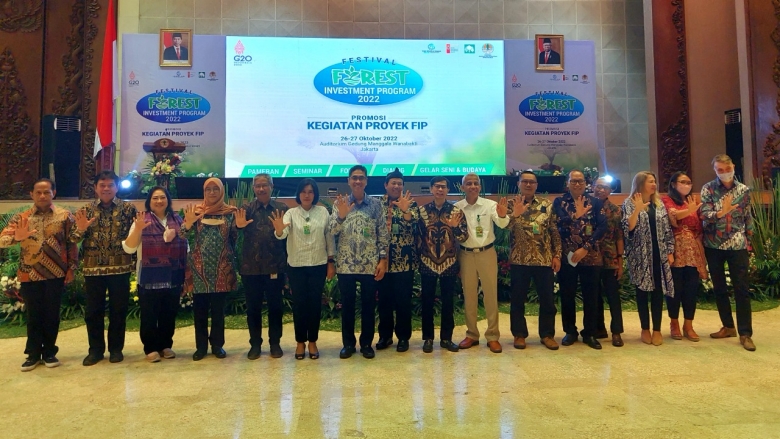
Forest Investment Program (FIP) Festival 2022 held in Jakarta to Promote Achievements in Sustainable Forest Management in Indonesia
As part of the Forest Investment Program (FIP), the Ministry of Environment and Forestry (MoEF) represented by the Directorate General of Sustainable Forest Management, held a two-day FIP festival at the Manggala Wanabhakti in Jakarta. The festival showcased FIP 1, FIP 2, and the Dedicated Grant Mechanism Indonesia (DGMI) projects that comprise the FIP. FIP 2 and DGMI are World Bank-supported projects that aims to strengthen institutional and local capacities for decentralized forest management, improve capacity of Indigenous Peoples and local communities to engage in tenure security processes and develop livelihood opportunities from forests and lands. During the course of the program, FIP 2 has provided support to 95 Forest Farmer Groups (Kelompok Tani Hutan, KTH) in 10 targeted Forest Management Units (Kesatuan Pengelolaan Hutan, KPH) with more 119,170 direct beneficiaries (of which 30% are female and 16,000 are Indigenous Peoples and local communities). Meanwhile, DGMI helped to accelerate recognition of 2,087,902 hectares of Customary Area claims and 182,262 hectares of Customary Forest/Social Forestry claims. Lessons learned from these projects are hoped to contribute to the FoLU Net Sink 2030 agenda. DGMI will conclude in November 2022 and FIP 2 will conclude at the end of December 2022.
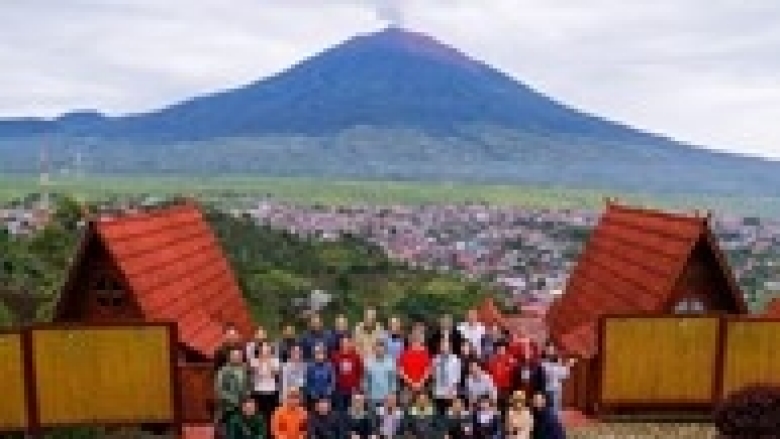
Indonesia Sustainable Landscape Management Program (SLMP) Delegation Conducts Study Visit to Jambi Province
The World Bank hosted a delegation under the Sustainable Landscape Management Program (SLMP) on a 3-day study visit to Jambi City and Kerinci Seblat National Park with the aim to learn about Indonesia’s evolving priorities in landscape management and what can be done to accelerate transition to sustainable land use in line with Indonesia’s FOLU Net Sink 2030 goals. Together with representatives from the Government of Indonesia, Government of Jambi and regional management from the World Bank, the SLMP delegation held meetings in Jambi to discuss the design and preparation of the Jambi Emissions Program, learned about the province’s priorities for green growth, and observed results from SLMP-supported activities on the ground.
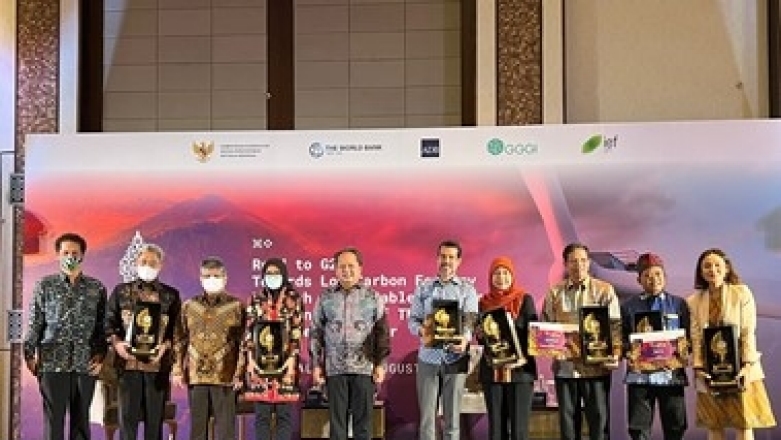
World Bank G20 Side Event Panel Discussion on Green Economy Stories: Sustainable Landscape Management to Reduce GHG Emissions and Improve Local Economies
The World Bank continues to support to the Government of Indonesia’s effort to achieve low carbon economy through the Sustainable Landscape Management Program. In line with this objective, the World Bank co-hosted a panel discussion as part of the Coordinating Ministry of Economic Affair’s (CMEA) road to G20 event themed: “Towards Low Carbon Economy Through Sustainable Practices And Financing of the Environment and Energy Sector”. The panel discussion, titled: “Green Economy Stories: Sustainable Landscape Management to Reduce GHG Emissions and Improve Local Economies”, invited key stakeholders to highlight how integrated landscape approach are being implemented, both at the national and subnational level, and the impact they bring to Indonesia’s climate ambition and livelihood of its people.
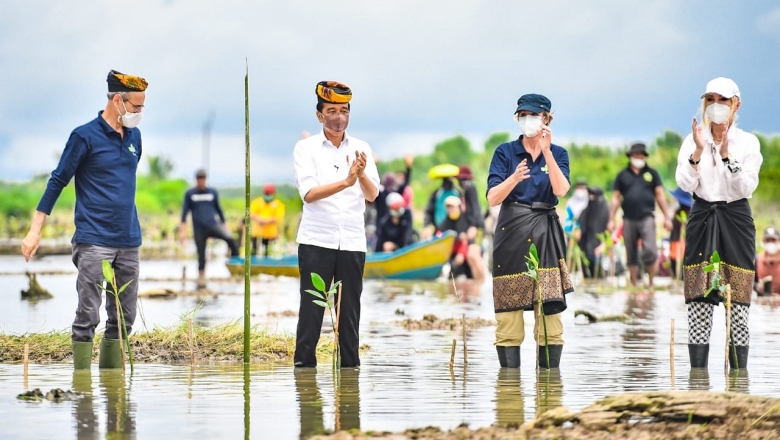
Indonesian President Jokowi launched the Mangroves for Coastal Resilience Program (M4CR)
The World Bank continues to support the Government of Indonesia's objective to rehabilitate 600,000 hectares of degraded mangroves by 2024 and conserve existing mangroves, including through the Mangrove for Coastal Resilience Program (M4CR). Read more about the project in the press release and in the Op-Ed written by ENB Indonesia's coordinator André Rodrigues de Aquino.
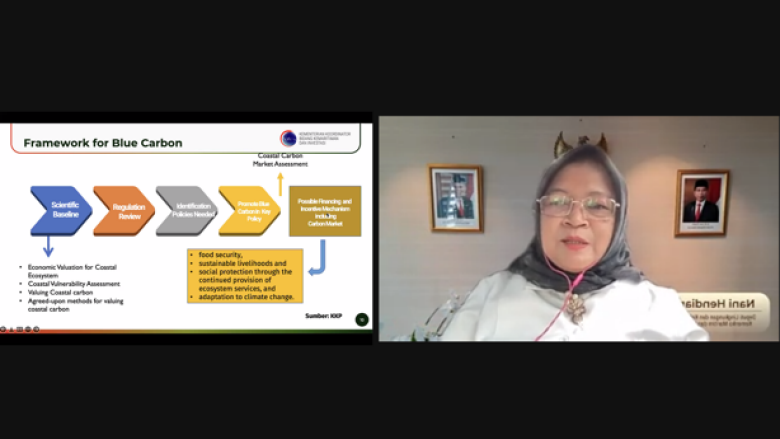
Knowledge sharing session on Blue Carbon for Mangroves
As part of the preparation for the Mangroves for Coastal Resilience (M4CR) program, the ENB team in partnership with the Government of Indonesia hosted an online knowledge sharing session on Blue Carbon. This session resulted in several key agreements, including how the project will support blue carbon on a large scale and discussed insights on how carbon emission reductions from mangroves’ rehabilitation and conservation will be integrated in Indonesia’s emissions reduction goal (NDC) and directly contribute to Indonesia’s target for the forestry and land use (FoLU) sector to be a net carbon sink by 2030.
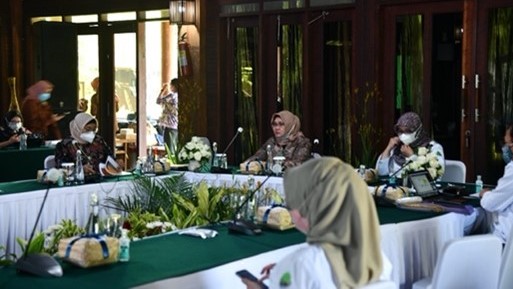
Mangrove for Coastal Resilience (M4CR): Public Consultation
In line with the preparation of the Mangrove for Coastal Resilience (M4CR) program, the Ministry of Environment and Forestry (KLHK) and the Peatland and Mangrove Restoration Agency (BRGM) held a public consultation event with support from the World Bank. This event was attended by various government agencies, including regional officials from the four provinces where the project will be implemented, namely North Sumatra, Riau, East Kalimantan, and North Kalimantan.
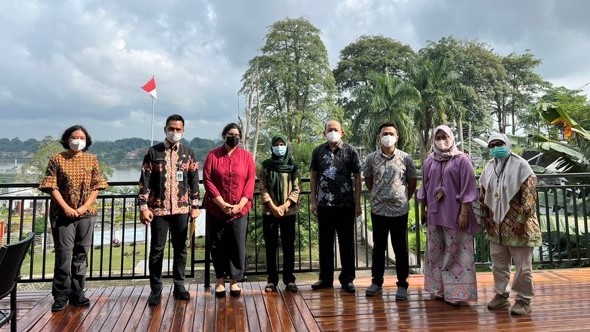
BioCarbon Fund Initiative for Sustainable Forest Landscapes (BioCF ISFL): Implementation Progress Workshop in Jambi
As part of the BioCF ISFL, the Jambi Sustainable Landscape Management Program team held a two-day workshop with representatives from the Ministry of Environment and Forestry (KLHK) and regional officials from the Province of Jambi in February 2022. The objective of the workshop was to discuss program implementation progress, the annual work plan for 2022, and institutional arrangements. The BioCF ISFL program also supports the preparation of an Emission Reduction Payment Agreement (ERPA), which will provide results-based payments to the Province of Jambi for verified emissions reductions.
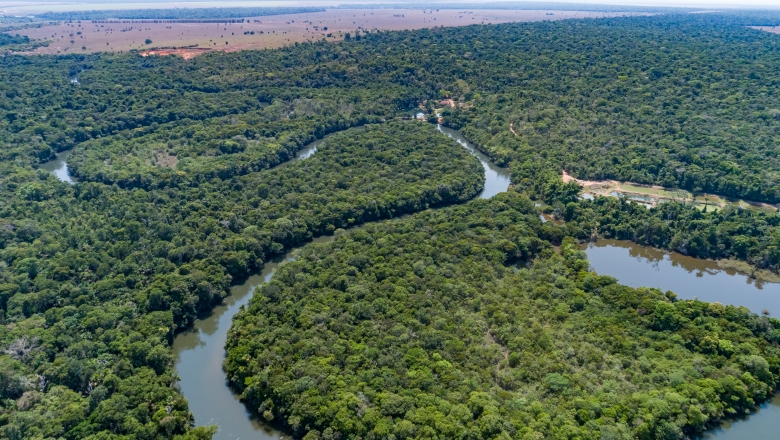
Learning from Mato Grosso, Brazil: An Informal Knowledge Exchange
On June 1st, the SLMP team held an informal knowledge exchange session on the experience of developing and implementing a jurisdictional REDD+ program in the state of Mato Grosso in Brazil with Daniela Mariuzzo (Regional Director for the IDH Landscapes Program in Latin America), Fernando Sampaio (Executive Director of the PCI Institute), and Alice Thuault (Deputy Director of ICV or The Life Center Institute). The experience from Mato Grosso demonstrates the importance of bringing stakeholders together to deliver an integrated landscape management.
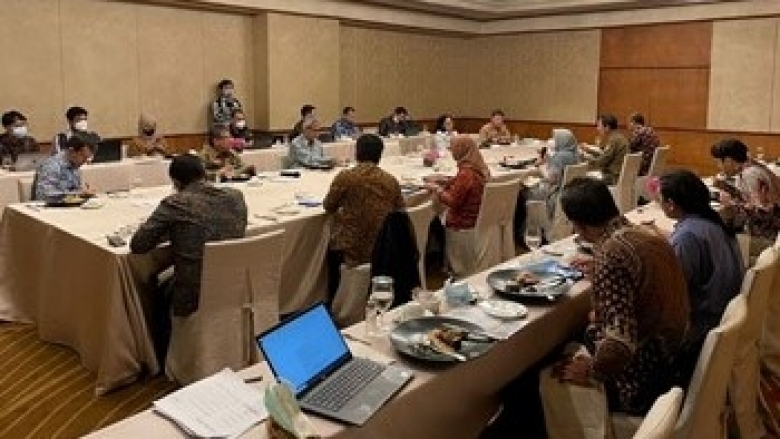
Progress for Partnership for Market Implementation (PMI) on Carbon Pricing Instruments in Indonesia
The Partnership for Market Implementation (PMI) assists countries to design, pilot, and implement carbon pricing instruments aligned with their development priorities. This initiative brings a long-term vision for the viability of carbon markets that contribute to the Paris Agreement goal of limiting temperature rise to 1.5°C. In Indonesia, the World Bank has been supporting the government with the implementation of carbon pricing instruments in line with Presidential Regulation 98/2021 on Carbon Economic Valuation. Since the enactment of the regulation in October 2021, PMI has continued to provide technical and operational support, including in the implementation of a mandatory decree on an Emission Trading System (ETS) combined with a Carbon Tax in the coal power sector, which will come into force by April 2022. The full PMI program will begin in June 2022 and continue to develop a roadmap for the implementation and infrastructure of carbon pricing mechanisms for various sectors in Indonesia.
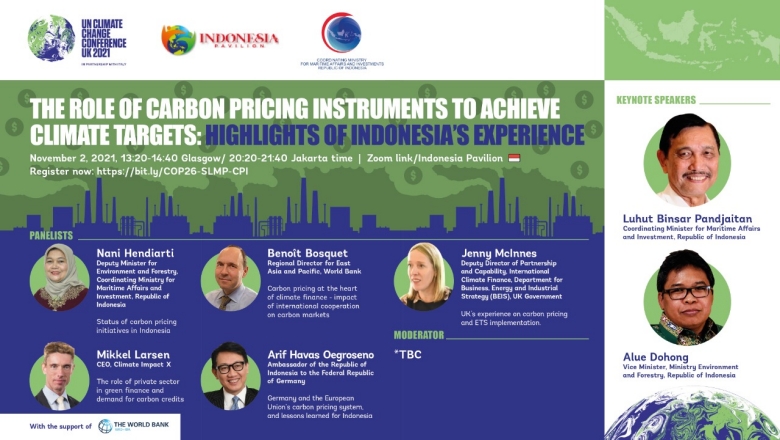
The World Bank supported 2 side events of the Government of Indonesia at COP26 Indonesia Pavilion in Glasgow
The World Bank supports the Government of Indonesia to meet the country's climate target, including the NDC and the FOLU net sink target by 2030. As part of this support, together with the Coordinating Ministry of Maritime Affairs and Investment and the Coordinating Ministry for Economic Affairs, the World Bank co-hosted 2 side events at the COP26 Indonesia Pavilion on “The Role of Carbon Pricing Instruments to Achieve Climate Targets: Highlights of Indonesia’s Experience”, and “Leading Climate Actions Together: Best Practices on Sustainable Landscape Management in Indonesia”. These sessions highlighted the importance of carbon pricing instruments and an integrated landscape approach to achieve Indonesia’s climate and development goals.
Watch the recording here (Start at 3:43:41) and here (Start at 4:15:41).
Vulnerability Mapping Assessments Underway for One Map Project
As part of the One Map Project, the Ministry of Agrarian and Spatial Planning (ATR/BPN) has started with location-specific vulnerability mapping assessments to identify and engage with more stakeholders (e.g. women, Indigenous Peoples, and other identified vulnerable groups).
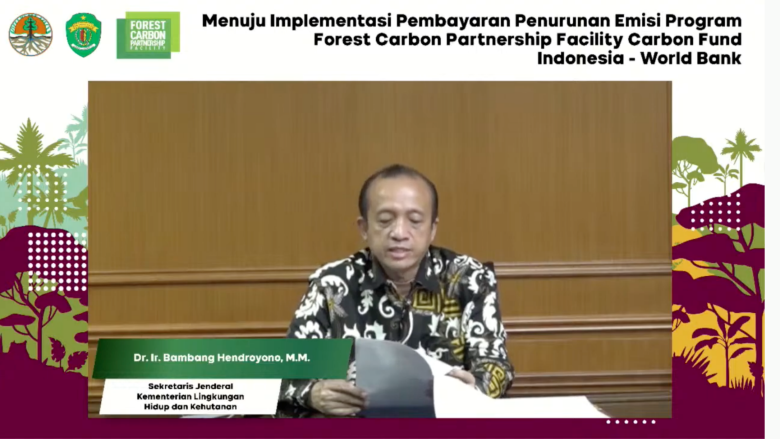
Indonesia and the World Bank Sign Milestone Agreement on Emission Reductions
On November 27, 2020, Indonesia’s Ministry of Environment and Forestry (MoEF) and the World Bank’s Forest Carbon Partnership Facility (FCPF) signed a landmark agreement to unlock up to US$110 million to lower carbon emissions from deforestation and forest degradation until 2025.
Safeguarding Emission Reduction Programs amid COVID-19
To ensure safeguards are followed throughout the Emissions Reduction (ER) program, the government of Indonesia will enact a Free Prior Inform Consent (FPIC) to 150 villages by the end of September 2020.
World Bank working in partnership with Indonesia’s flagship Environmental Funds Management Agency
The World Bank continues to work closely and provide Technical Assistance to the BPDLH (Badan Pengelola Dana Lingkungan Hidup - Environmental Funds Management Agency) to support operationalization and become a flagship environmental and climate fund management agency in Indonesia.
SLMP Strengthens Ties with Jambi Province
The World Bank meets with the Head of the Jambi Regional Development Agency (BAPPEDA) to discuss potential collaboration for sustainable landscape management practices.
RELATED
PAST NEWSLETTERS
- ENB Newsletter
- ENB Newsletter (#4) Partnership And Collaboration For The Environment
- ENB Newsletter (#3) Partnership for Climate Resilience
- ENB Newsletter (#2) World Environment Day 2022 Edition
- ENB Newsletter (#1) International Day of Forest Edition: A New Face
- SLMP Newsletter
- April 2023: Celebrating the Forest and All It Gives
- July 2022: World Mangrove Day Edition
- June 2022: Recap of Bicara Bumi Mangroves
- March 2022: Blog on Jambi
- June 2021: World Environment Day Special Edition
- April 2021: SLMP Newsflash 9th Edition
- September 2020: SLMP Newsflash 8th Edition Show More + Show Less -
